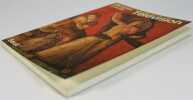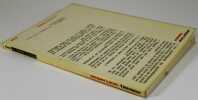Jacques Lacan
Télévision
Seuil 1974 Broché - Couverture glacée illustrée éditeur - 72 pages Bon état 104 g
Reference : 2151
Bookseller's contact details
ART BOHEME - l'esprit du Carré-Rond
Mme Joséphine Montiel
07 60 20 91 45
Payment mode

Sale conditions
Règlement par chèque, virement bancaire, paypal, CB. Envoi à réception du règlement. Les frais de port sont à la charge de l'acheteur et s'entendent : - par La Poste, à domicile en "Colissimo" ou "Lettre suivie"; - Mondial Relay, en point relais le plus près de l'adresse d'envoi. Les frais de port sont offerts pour les envois en France métropolitaine à compter de 80,00 euros de commande.
5 book(s) with the same title
La télévision
Presses Universitaires de France Sans date. Il s'agit de la 9e édition mise à jour (1969) d'un ouvrage de la collection "Que sais-je ?" des Presses universitaires de France consacré à la télévision écrit par Pierre Grivet et Pierre Herreng avec la collaboration de Roger Chaste et une préface de Paul Labat. Ce livre présente un état des connaissances techniques et scientifiques sur la télévision à cette époque
Bon état
Le Nouvel Observateur 187 Les insurgés de la Télévision juin 1968
1968 1968. Le Nouvel Observateur 187 : Les insurgés de la Télévision (Juin 1968)
Très bon état
Revue Esprit La Société des écrans et La Télévision mars avril 2003
2003 2003. Revue Esprit - La Société des écrans et la Télévision / Mars-Avril 2003
Très bon état
d s Halacy jr Les hommes volants Junior television
1964 1964. D.S. Halacy Jr. - Les hommes volants / Junior Television 1964
André Diligent La Télévision progrès ou décadence hachette
1965 1965. André Diligent - La Télévision progrès ou décadence? / Hachette 1965
Bon état
 Write to the booksellers
Write to the booksellers




